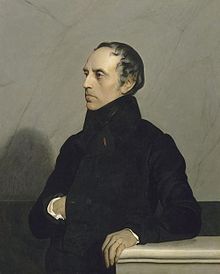George Smith on altruism and the Antirand.
Tag Archives | Industriels
Everyone Named Steph… M… Is Podcasting Us!
You’ve read the book; you’ve bought the button; now hear the audiobook! Stephanie Murphy reads Markets Not Capitalism.
Did I mention it’s free?
And in case you missed it, Stefan Molyneux also reads one of my chapters from the book.
Power Trip

Guizot reaching for his revolver
The following passage from the end of Guizot’s General History of Civilization in Europe reminds me of both Proudhon and Foucault:
It is the duty, and will be, I believe, the peculiar event of our time, to acknowledge that all power, whether intellectual or temporal, whether belonging to governments or peoples, to philosophers or ministers, in whatever cause it may be exercised – that all human power, I say, bears within itself a natural vice, a principle of feebleness and abuse, which renders it necessary that it should be limited. Now, there is nothing but the general freedom of every right, interest, and opinion, the free manifestation and legal existence of all these forces – there is nothing, I say, but a system which insures all this, can restrain every particular force or power within its legitimate bounds, and prevent it from encroaching on the others, so as to produce the real and beneficial subsistence of free inquiry.
Secular Growth

Destutt de Tracy, whom Jacob Levy has described as having “a plausible claim to being the first libertarian,” was a major influence on both Thomas Jefferson (who called his work “the most precious gift the present age has received”) and the Censeur group (Augustin Thierry praised him to the skies), and a contributor to the development of libertarian class theory. (Karl Marx for his part called Tracy a “fish-blooded bourgeois doctrinaire,” but you can’t please everybody.)
According to Leonard Liggio, in his introduction to Thierry’s Theory of Classical Liberal “Industrielisme”, Tracy was regarded by his contemporary Stendahl as being so far ahead of his time as to be more a thinker of the 20th century than of the 19th; Stendahl suggested (evidently in 1835) that Tracy might turn out to be the “philosopher of 1935.”
Considering what the world’s political and intellectual climate would actually turn out to be in 1935, the prediction now looks ironic and rather sad. But let’s see what we can do for 2035.
Molinari on Mutualism
Shawn Wilbur has translated an excerpt from Molinari’s The Red Clubs During the Siege of Paris, critiquing the mutualists. But I fear this conflict between the heir of Bastiat and the heirs of Proudhon sheds no more light than that between the originals.
Soirées Online
A preliminary draft of Liberty Fund’s new translation of Molinari’s 1849 Soirées on the Rue Saint-Lazare – a series of dialogues between a libertarian (representing the author’s viewpoint), a conservative, and a state-socialist – is now online.